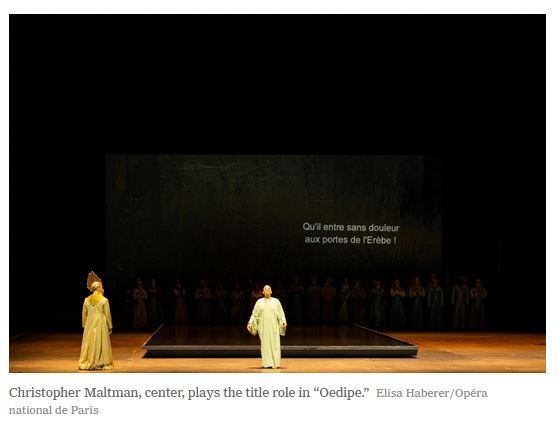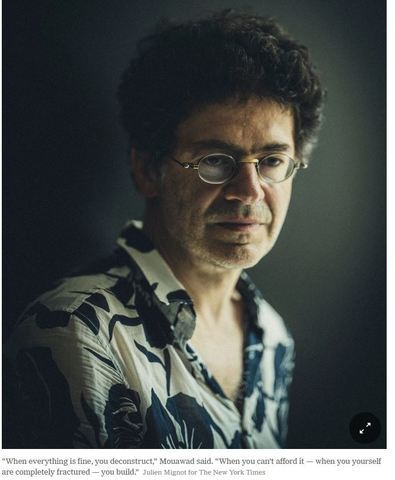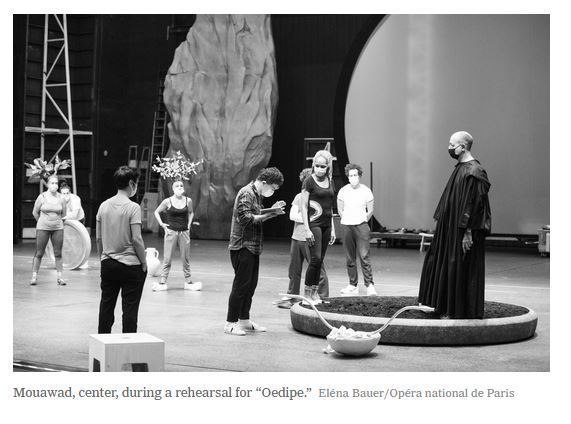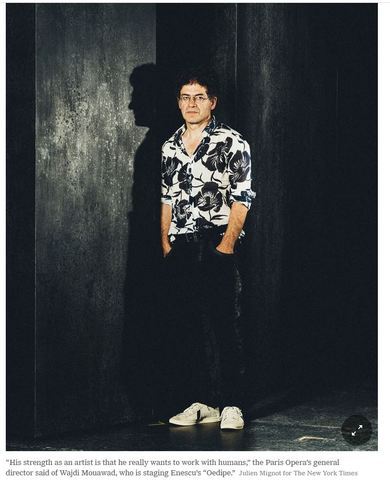Staged by the playwright and director Wajdi Mouawad, Enescu’s opera helps inaugurate a new era for the storied company.




By Laura Cappelle
Sept. 16, 2021
Lire en français
PARIS — Ahead of rehearsals for his staging of George Enescu’s “Oedipe” at the Paris Opera, the playwright and director Wajdi Mouawad did something unusual. He put together a glossary of all the obscure references in the libretto — like “the water of Castalia,” a sacred spring in Delphi — and sent it to the chorus.
Mouawad, 52, who runs the Théâtre National de la Colline in Paris, was taken aback to find the choristers had never received anything like it. When he approached the company’s technical crew to explain to them the story of “Oedipe,” a rarity from the 1930s based on the Greek myth, their reaction was similar, he said in an interview — few directors ever bothered to pay them much mind.
“It’s odd, because I hear, ‘It’s wonderful, you say hello,”” Mouawad added. “I feel like I’m stepping into a traumatized world that now believes its trauma is the norm.”
Trauma is not a bad way of describing the past few years at the fractious Paris Opera. In late 2019 and early 2020, labor strikes over a pension policy overhaul resulted in a 45 million euro deficit in a budget hovering around 230 million euros. And that was before the pandemic forced the cancellation of over a year’s worth of performances. (While some performances took place in September and October last year, the company didn’t resume its regular schedule until late May.)
So “Oedipe,” which opens at the Opera Bastille, the company’s larger theater, on Monday, may just inaugurate a new era. It is the first production that was commissioned by Alexander Neef, who took over as the Opera’s general director last year.
It is no coincidence that he turned to Mouawad. In his last job, leading the Canadian Opera Company in Toronto, Neef co-produced Mouawad’s first stab at opera, a 2016 production of Mozart’s “The Abduction From the Seraglio,” that Neef calls “one of the most satisfying experiences that I’ve ever had with a director.”
“His strength as an artist is that he really wants to work with humans,” Neef added in an interview in his office. “With ‘Oedipe,’ my hope was that he would pull the whole company together. Sometimes, you almost need to encourage him not to be too nice.”
The return of “Oedipe” to the Paris stage has been a long time coming. Enescu’s only opera, it had its premiere at the company’s smaller, ornate Palais Garnier in 1936, but has never been revived there, even as other opera houses took a belated interest in it. The North American premiere took place at the University of Illinois in 2005, while Achim Freyer directed an acclaimed staging at the Salzburg Festival two years ago, conducted by Ingo Metzmacher, who will return to the score in Paris.
Neef believes the course of history, rather than quality, explains the long lack of appetite for “Oedipe,” which earned positive reviews upon its premiere. The New York Times reported in 1936 that the French composer and critic Reynaldo Hahn had described it as “imposing, lofty, minutely elaborated” and “always compelling admiration.”
“After 1945, I think the music had fallen out of fashion,” Neef said of Enescu’s lush score. “For a lot of composers writing after the Holocaust, it couldn’t be tonal music anymore, for a long time.”
When Neef first approached him, Mouawad was less concerned with the score than with the libretto. The legend of Oedipus was familiar to him: In his 30-year career, Mouawad has staged Sophocles’s “Oedipus the King” three times. In 2016, he also wrote a play, “The Tears of Oedipus,” that tied the character’s plight to modern Greek politics.
The librettist of “Oedipe,” Edmond Fleg, closely based the third and fourth acts on “Oedipus the King” and another play by Sophocles, “Oedipus at Colonus.” (The first and second acts flesh out the plays’ background.) “It’s slightly summarized, but the dialogue is essentially the same,” Mouawad said. “I thought I would have space to tell this story.”
Storytelling has long driven Mouawad, who was born in Lebanon in 1968. When he was 10, his family fled the civil war, moving first to France, then to French-speaking Quebec.
“When I tried to understand the Lebanese civil war, I was either told that there was nothing to understand, or that it was the fault of others,” Mouawad said. “There was a gaping lack of stories in my life.”
After training as an actor at the National Theater School in Montreal, Mouawad rose to prominence with an epic tetralogy, “The Blood of Promises,” that has been produced all over the world. Composed of “Littoral” (1999), “Scorched” (2003), “Forests” (2006) and “Skies” (2009), it delved into intergenerational trauma, war and displacement.
His work has served as an introduction to contemporary theater for many French-speaking millennials. Even after he moved back to Paris in 2016 to direct the Théâtre de la Colline, Mouawad steered clear of the prevailing European taste for nonlinear, highly conceptual productions. Lisa Perrio, an actress who has worked with Mouawad several times in recent years, said that “he loves drama, pathos, and it works.”
“His work is the hardest thing I’ve ever had to perform,” she added, “because it requires so much emotion.”
To Mouawad, postmodernism is a luxury beyond the means of those who have experienced deep trauma. “I myself am postmodernism,” he said “There is nothing more postmodern than the Lebanese war. Deconstruction is a rich person’s thing. When everything is fine, you deconstruct. When you can’t afford it — when you yourself are completely fractured — you build.”
In March, a year into the disruption caused by the pandemic, the Théâtre de la Colline was one of the first French theaters to be occupied by protesters. Students and arts workers demanded government support and the withdrawal of changes to unemployment benefits. The movement soon spread to over 100 playhouses.
Sébastien Kheroufi, who was among the drama students who first entered La Colline, said in a phone interview that Mouawad was one of the few high-profile directors to extend the occupiers a warm welcome. “One night, he even stayed with us for several hours after his rehearsals because we needed to talk,” Kheroufi said.
Yet the end of the occupation, in late May, left Mouawad frustrated. He and his team offered the students the opportunity to stay on for the reopening and speak before shows; Mouawad also hoped to start a permanent youth company, offering year-round contracts to young actors.
They ultimately said no, Mouawad now speculates, “because the idea had come from us, and they didn’t want to owe us anything.” It was a blow for the hierarchy-averse Mouawad, who reflected on the “failure” of all parties of the occupation movement in a despondent open letter.
Then, in early September, just as rehearsals for “Oedipe” were in full swing, Mouawad’s longtime dramaturg François Ismert passed away. “He was such a luminous, atypical person,” Mouawad said. Ismert had introduced him to Sophocles in the 1990s — “and not just that,” he said. “To everything else, without ever being paternalistic.”
The loss loomed over the approaching premiere. Days before, though, Mouawad remained intent on sifting through the chaos.
“I know everything is in ruins,” he said, before returning to the rehearsal room. “But we have to make something of those ruins.”
https://www.nytimes.com/2021/09/16/arts ... opera.html